
 Flash News
Flash News
Two vehicles collide in Karbunara, one injured
Fire near the center for people with disabilities in Berat, suspected to be intentional
Internationally wanted for corruption, Loran Dusha extradited from Zimbabwe
Fire in Kavaja, a scrap metal collection point engulfed in flames
The appeal of the GJKKO leaves the seizure of Arben Ahmetaj's assets in force
"Experts see the end of the economic crisis", DW: German economy expected to recover in 2026
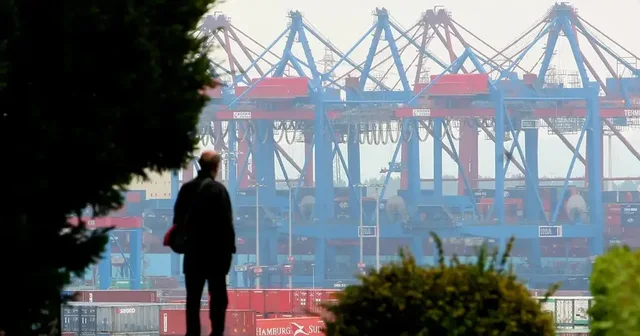
According to new economic forecasts by research institutes, the German economy is expected to emerge from the three-year crisis in 2026. The ifo institute has corrected its forecast for next year: according to this, gross domestic product (GDP) could grow by 1.5%, almost double the 0.8% originally projected.
Experts have also raised their forecasts for this year, from 0.2% to 0.3%. The Kiel Institute for the World Economy (IfW) also raised its forecast for next year to 1.6%. For the current year, economists raised their forecasts from 0.0% to 0.3%. "The key indicators confirm our assessment that, after two years of decline, the industry has reached the ceiling," explained Stefan Kooths, Director of Economics at IfW.
The principle of hope regarding Trump
"The crisis in the German economy reached its lowest level in the winter half of the year," said Timo Wollmershäuser, Ifo Economic Director. One of the reasons for the expected growth now is the growth package announced by the new German government.
Munich economists estimate that the economic impact of increased spending, tax cuts and investments will be 10 billion euros this year and 57 billion euros next year. However, the correction of the forecasts is mainly based on the thesis that the trade conflict with the EU caused by the US government should be resolved favorably.
"The growing optimism is probably also fueled by the hope that the new coalition will end the stagnation of economic policies and that an agreement will be reached on the trade dispute with the US," Wollmershäuser said. In the first quarter of 2025, economic performance has already increased by 0.4 percent, mainly due to projected exports to the US, but also due to higher consumption and private investment.
With the trade conflict between Europe and the U.S. still unresolved, economists continue to see risks in U.S. trade policy. According to ifo, customs tariffs increased by US President Donald Trump would reduce German economic growth by 0.1 percentage points this year and by 0.3 percentage points in 2026. If an agreement is reached on the trade dispute, the increase could be greater, while an escalation could lead to a new recession. In 2024 and 2023, Europe's largest economy contracted slightly.
Increased consumption and investment
According to IfW President Moritz Schularick, trade policy risks remain significant. "The erratic US tariff policy continues to increase uncertainty for the German foreign economy." In addition, German exporters are particularly affected by the significant loss of competitiveness. Therefore, the IfW predicts that exports will continue to fall this year by 0.4%. An increase of 1.2% is not expected until next year.
The IfW sees the reason for a positive development mainly in the domestic economy. "After two years of stagnation, private consumption is growing again and business investment is also gradually returning to positive territory," Kooths said. However, the dynamism of the private economy remains very moderate. The IfW is convinced that, while the new government coalition's increased room for manoeuvre in financial policy is increasingly felt over the next year, the pace of enlargement will accelerate significantly.
At the moment, Ifo does not expect inflation to rise: it is projected to reach 2.1 percent this year and 2.0 percent in 2026. According to these projections, the unemployment rate may fall slightly in 2026 as well. Ifo economists predict 6.3 percent this year and 6.1 percent next year. Since the beginning of the year, the business atmosphere has also improved: Ifo's business climate, which is determined by a survey of 9,000 managers, has improved over the past five consecutive months.
Other economists also see a recovery
Other economic institutes also updated their forecasts. According to the Leibniz Institute for Economic Research in Halle (IWH), the German economy is showing the first signs of recovery. "Signs of an economic recovery in Germany are multiplying," said Oliver Holtemöller, Vice President of IWH. Production increased by 0.4 percent in the first quarter. Private consumption also increased for the first time in a long time. One reason is the significant increase in demand from the United States.
According to the IWH, this is mainly due to importers who have brought their orders earlier due to the announcement of the tariff increase. According to the summer forecast, GDP is expected to grow by 0.4 percent this year. In March, the Institute still forecast a 0.1 percent increase. For 2026, IWH expects growth of 1.1 percent. A similar trend is expected in eastern Germany.
The RWI (Leibniz Institute for Economic Research) also forecasts GDP growth of 0.3 percent for this year. In the spring, Essen experts still expected a 0.1 percent decline in economic performance. For 2026, they now predict a growth of 1.5 percent. In the report presented in Berlin, the OECD predicts an increase of 0.4 percent. According to forecasts, this will reach 1.2 percent in 2026./DW
Latest news


Two vehicles collide in Karbunara, one injured
2025-06-14 21:36:38
A person is found without signs of life in Peja
2025-06-14 21:18:19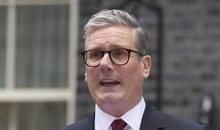

Are you hungry after exercising? Experts recommend these snacks
2025-06-14 20:36:24

Kudos to Edi Rama for committing the May 11 theft in front of the cameras!
2025-06-14 19:57:21


These are the 3 most jealous zodiac signs
2025-06-14 19:01:29
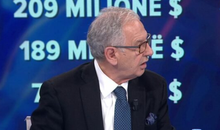
Nesho: Iran is the violator of nuclear production
2025-06-14 18:21:43


A scrap metal collection point in Kavaja is engulfed in flames
2025-06-14 17:19:47
After Israeli attacks, Iran considers blocking the Strait of Hormuz
2025-06-14 17:02:28


Ja çfarë i ndodh organizmit tuaj nëse konsumoni çdo ditë limon
2025-06-14 16:16:23



Internationally wanted for corruption, Loran Dusha extradited from Zimbabwe
2025-06-14 15:30:04
VIDEO/ Dubai skyscraper engulfed in flames, 3,800 residents evacuated
2025-06-14 15:16:49
With these 5 ways, you can cope with the heat even at home
2025-06-14 15:08:46


Fire in Kavaja, a scrap metal collection point engulfed in flames
2025-06-14 14:43:40
Israel eliminates 9 scientists of the Iranian nuclear program
2025-06-14 14:33:34
The appeal of the GJKKO leaves the seizure of Arben Ahmetaj's assets in force
2025-06-14 14:17:14
Less appearance, more connection: How the way men love is changing
2025-06-14 14:16:13
Astrit Sinanaj is arrested in Tirana, he tried twice to kill a businessman
2025-06-14 14:02:59
Accident on Arbri Road, two foreign tourists end up in Trauma
2025-06-14 13:37:03




Tourist found dead inside apartment in Vlora
2025-06-14 12:46:40

Accident in Levan, truck with kitchen utensils ends up in the canal
2025-06-14 12:12:57

Clashes at the Order of the Psychologist, Treska declares the elections invalid
2025-06-14 11:45:55





The weekend brings luck for this zodiac sign, a pleasant surprise is coming!
2025-06-14 10:34:31
Caught with firearms and drugs in the car, two people arrested at "Ali Demi"
2025-06-14 10:25:17
Analysis: Israel's attack on Iran, ignition of conflict in the Middle East?
2025-06-14 10:16:14
Gambling in a bar, the owner and the waiter are arrested in Divjaka (NAMES)
2025-06-14 10:07:27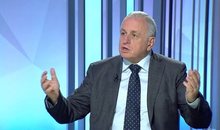
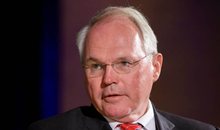
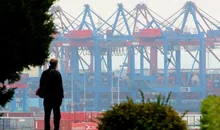


Tourist packages, how much does Albania "cost"
2025-06-14 08:58:23


From sun to clouds, what will the weather be like this Friday in Albania
2025-06-14 08:19:49
Morning mail/ With 2 lines: What mattered yesterday in Albania
2025-06-14 08:08:49
CEC decides to limit spending on local election campaign in Kosovo
2025-06-13 22:54:43
Israel confirms US support for the neutralization of missiles by Iran
2025-06-13 22:37:44

Foods you should avoid after your 40s for health
2025-06-13 22:05:07
Possessive and toxic, get to know the 3 most jealous signs of the horoscope
2025-06-13 21:51:58
Poland: A Russian plane violated our airspace!
2025-06-13 21:40:15



Tragedy in Kurbin/ Fire engulfs pig barn, 450 pigs burned alive
2025-06-13 20:40:44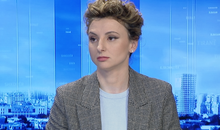
Xixho: Without functional democracy, EU integration remains an illusion!
2025-06-13 20:27:45

UN: Gaza aid group has failed in its mission
2025-06-13 20:04:32

BIRN: Half of Albanians have a gross salary of less than 62 thousand lek!
2025-06-13 19:31:41
Revenge warned/ Iran raises red flag over mosque, consequence of Israeli attacks
2025-06-13 19:23:10
Albanian man killed in metro station, two Englishmen found guilty
2025-06-13 19:08:41
How recommended is a midday nap for health?
2025-06-13 19:01:58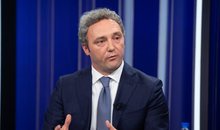

Serious in Italy/ Albanian stabs 23-year-old in Ravenna, escapes on motorcycle
2025-06-13 18:18:57
Car catches fire in Bulqiza, driver and passengers rescued
2025-06-13 17:59:20

Attacks on Iran/ Tirana-Tel Aviv flights canceled, embassy closed
2025-06-13 17:35:45
Apple warns again: Don't sleep with your iPhone while charging!
2025-06-13 17:20:31
Albanian youth raped worker in Greece, surrenders to police (NAME)
2025-06-13 16:59:50
Plenary session in the Parliament on Monday, what will be discussed?
2025-06-13 16:42:10


Fire in Berat, a bushy area is engulfed in flames
2025-06-13 16:06:18
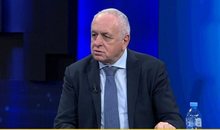

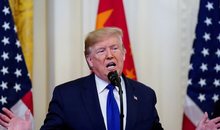
Israeli attacks, Trump calls on Iran: A deal must be made, before it's too late
2025-06-13 15:19:21

Israel's attacks on Iran raise oil prices worldwide
2025-06-13 14:56:37
The Kosovo Assembly is not constituted even in the 31st attempt
2025-06-13 14:41:24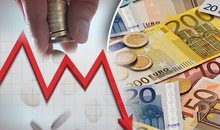
Euro hits 'bottom', European currency drops to new historic low
2025-06-13 14:30:28
First outbreak of small cattle plague confirmed in Korça
2025-06-13 14:19:51
Kiara Tito "in mourning", experiences great pain: I will always miss your voice
2025-06-13 14:13:47
